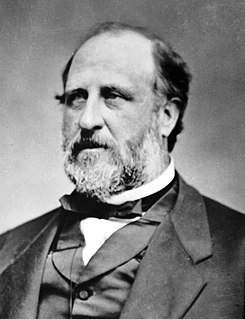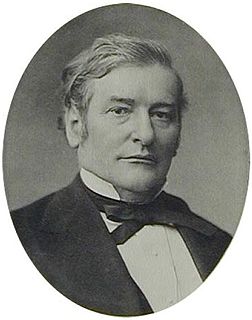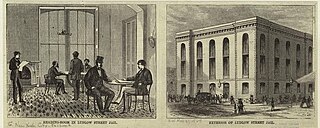 W
WWilliam Magear Tweed, often erroneously referred to as "William Marcy Tweed", and widely known as "Boss" Tweed, was an American politician most notable for being the "boss" of Tammany Hall, the Democratic Party political machine that played a major role in the politics of 19th-century New York City and State. At the height of his influence, Tweed was the third-largest landowner in New York City, a director of the Erie Railroad, a director of the Tenth National Bank, a director of the New-York Printing Company, the proprietor of the Metropolitan Hotel, a significant stockholder in iron mines and gas companies, a board member of the Harlem Gas Light Company, a board member of the Third Avenue Railway Company, a board member of the Brooklyn Bridge Company, and the president of the Guardian Savings Bank.
 W
WNoah Davis was an American lawyer and politician from New York.
 W
WDavid Dudley Field II was an American lawyer and law reformer who made major contributions to the development of American civil procedure. His greatest accomplishment was engineering the move away from common law pleading towards code pleading, which culminated in the enactment of the Field Code in 1850 by the state of New York.
 W
WJohn Thompson Hoffman was the 23rd Governor of New York (1869–72). He was also Recorder of New York City (1861–65) and the 78th Mayor of New York City (1866–68). Connections to the Tweed Ring ruined his political career, in spite of the absence of evidence to show personal involvement in corrupt activities. He is to date the last New York City mayor elected Governor of New York.
 W
WThe Ludlow Street Jail was New York City's Federal prison, located on Ludlow Street and Broome Street in Manhattan. Some prisoners, such as soldiers, were held there temporarily awaiting extradition to other jurisdictions, but most of the inmates were debtors imprisoned by their creditors. Seward Park Campus now sits on the site of the jail.
 W
WThomas Nast was a German-born American caricaturist and editorial cartoonist often considered to be the "Father of the American Cartoon". He was a critic of Democratic Representative "Boss" Tweed and the Tammany Hall Democratic party political machine. Among his notable works were the creation of the modern version of Santa Claus and the political symbol of the elephant for the Republican Party (GOP). Contrary to popular belief, Nast did not create Uncle Sam, Columbia, or the Democratic donkey, although he did popularize those symbols through his artwork. Nast was associated with the magazine Harper's Weekly from 1859 to 1860 and from 1862 until 1886.
 W
WThe Ophiuchi Hotline is a 1977 science fiction novel by American writer John Varley. It was nominated for a Locus Award. Part of his Eight Worlds series, the novel opens in the year 2618.
 W
WPeter Barr Sweeny was an American lawyer and politician from New York.
 W
WTammany Hall, also known as the Society of St. Tammany, the Sons of St. Tammany, or the Columbian Order, was a New York City political organization founded in 1786 and incorporated on May 12, 1789, as the Tammany Society. It became the main local political machine of the Democratic Party, and played a major role in controlling New York City and New York State politics and helping immigrants, most notably the Irish, rise in American politics from the 1790s to the 1960s. It typically controlled Democratic Party nominations and political patronage in Manhattan after the mayoral victory of Fernando Wood in 1854, and used its patronage resources to build a loyal, well-rewarded core of district and precinct leaders; after 1850 the vast majority were Irish Catholics due to mass immigration from Ireland during and after the Irish Famine.